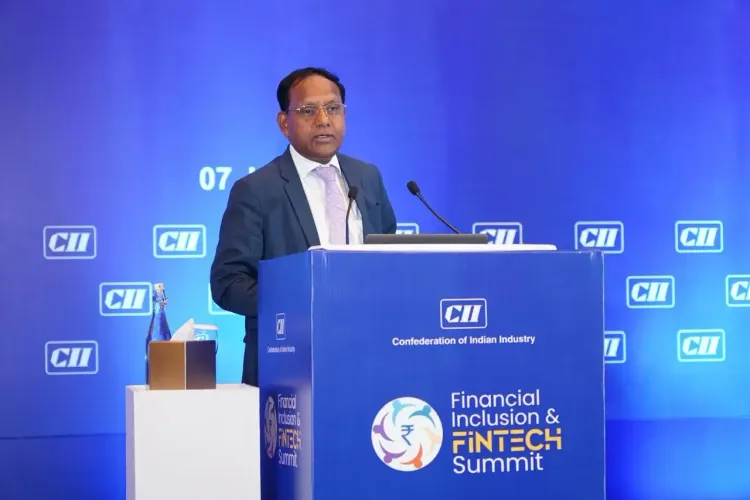How Can Fintechs Leverage AI to Combat Fraud and Promote Financial Inclusion?

Synopsis
Key Takeaways
- Fintech innovation is crucial for financial inclusion.
- AI can enhance security against fraud.
- Government initiatives support fintech growth.
- Women's empowerment is vital for economic development.
- Rural areas can greatly benefit from fintech solutions.
New Delhi, July 7 (NationPress) Fintech firms are encouraged to utilize their innovative capabilities not only to provide financial services to a broader audience but also to create strong defenses against fraud, hacking, and various cyber threats by harnessing cutting-edge technologies like artificial intelligence (AI), a senior government official stated on Monday.
As the nation’s digital payments landscape continues to evolve at a rapid pace, its impact is now reaching beyond national boundaries to the Global South, remarked Nagaraju Maddirala, Secretary of the Department of Financial Services (DFS).
Speaking at the opening session of the third ‘Financial Inclusion and Fintech Summit’ organized by the Confederation of Indian Industry (CII), he stressed the vital importance of fintech in promoting financial inclusion and protecting consumers.
Nagaraju reiterated the government's firm dedication to financial inclusion and equal access to credit.
He pointed out the government's ongoing initiatives to cultivate a favorable environment for fintech innovation, supported by a strong digital framework and transformative welfare programs.
Among these initiatives are the Jan Dhan Yojana and Jan Suraksha Schemes, which include the Pradhan Mantri Suraksha Bima Yojana, Pradhan Mantri Swanidhi Yojana, and the Atal Pension Yojana, which have greatly widened access to formal financial services.
He also highlighted that a significant portion of these financial services and loans has been accessed by women, boosting women’s empowerment and facilitating inclusive economic development.
“It is a matter of immense pride for every Indian that India is leading the way in payment systems, and we are actively working to expand our digital payment ecosystem to several other countries. We currently have a presence in seven countries and are in discussions with a few more,” Nagaraju shared with attendees.
Shaji KV, Chairman of NABARD, emphasized that India’s journey towards Viksit Bharat can only accelerate when the general population — especially those in rural areas — become engaged participants in the country’s growth narrative.
He mentioned that the increasing aspirations within rural communities can be effectively met through enhanced efficiency in financial operations, driven by fintech innovations.
Shaji called for disruptive innovation in the industry and urged focused efforts to tackle challenges such as interoperability and KYC regulations in economic activities.
He emphasized the transformative power of digital public infrastructure, particularly in sectors like agritech, fisheries tech, and cooperative tech, which can significantly enhance rural incomes through scalable digital solutions.
He also mentioned plans to integrate all Regional Rural Banks (RRBs) onto a unified digital platform and noted that NABARD is actively digitizing agricultural value chains to bridge the rural-urban gap. Additionally, he highlighted the critical role of women’s empowerment through fintech-driven financial access and inclusion.
According to Prashant Kumar, Chair of the CII National Committee on Fintech and Managing Director and CEO of YES BANK, as India moves towards Viksit Bharat, the focus on inclusive economic growth, especially for marginalized communities, has led to tangible improvements in areas such as poverty alleviation, education, healthcare, and infrastructure.










